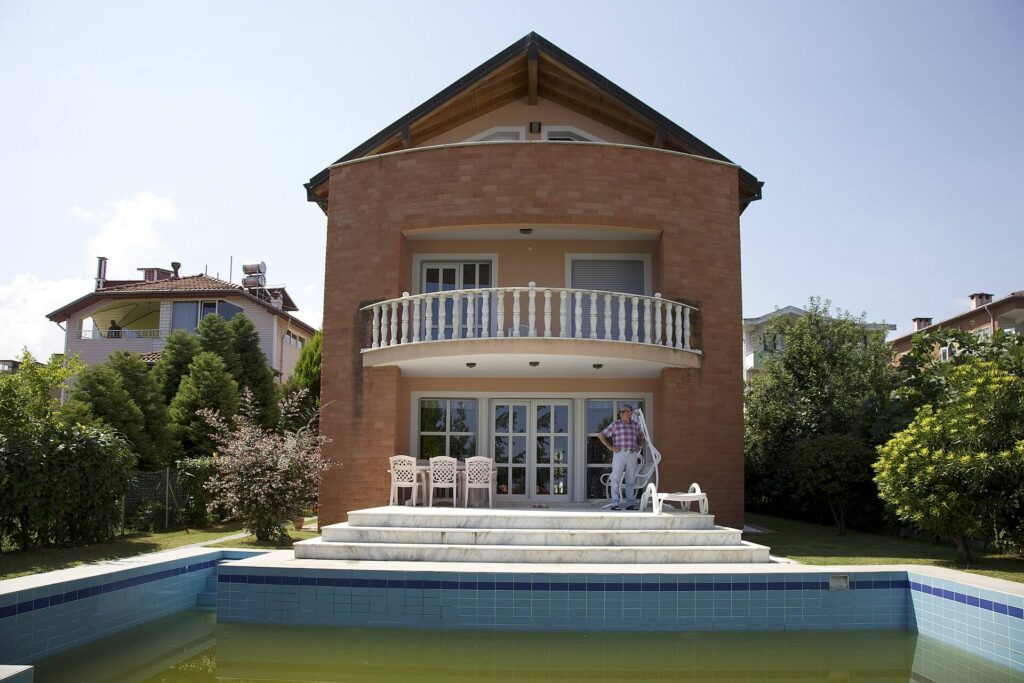
Migrating Spaces
Over a period of four years (2012-2015), an interdisciplinary team of artists and scholars investigated the design and spatial characteristics of houses built by returnees or commuting migrants in Turkey. On a total of eight field research trips, twenty Turkish provinces were visited in order to draw conclusions about the continuity and change in their lifestyles through the analysis of the returnees’ building culture. For this purpose, 132 houses and apartments in Turkey – also in their urban contexts – were mapped, examined and documented, and a total of 37 interviews were conducted with owners of 23 houses and 14 apartments. Three main typologies quickly emerged.
These typologies refer to the architectures we found, all of which emerged in the context of Turkish remigration and translocal connections and cultural experiences of Turkish-German builders as architecture without architects. We also noticed houses by returnees from Switzerland, Australia, Belgium, or the Netherlands; these, too, stand out considerably from their respective urban surroundings, thus confirming our project thesis regarding the visibility and existence of remigration architecture.
In the context of the project “Migration of Spaces”, we succeeded in shifting towards a post-migrant perspective through the exchange and collaboration with Erol Yildiz (Yildiz 2015). Migration, in the sense of a communication process, is not a bipolar conflict between a culture of origin and a culture of reception, because approach to the foreign and rejection of the foreign always happen in a mutual exchange process that also shapes the migration of spaces.
Spaces are constituted by the relative arrangements of bodies in motion (Löw 2001). The movement of remigration does not represent the counter-movement of migration, but an independent dynamic of bodies, spaces, and their imaginaries that relate each place to another. By taking this relatedness into account, the transnational pioneering achievements of migrants can now be understood as translocal movements. The distant spaces of culture of origin and culture of reception are no longer juxtaposed with the proximate spaces of village community in Turkey and family in the neighborhood of cities in Germany; rather, the local and the non-local become coupled, even though they have different referents.
The phenomenon of house building and its role for returnees has not yet received attention either in Germany or in Turkey. In most cases, the entire savings from working life in Germany are invested over a period of years in a construction project in the Turkish homeland. It comes not rarely to conflicts over building progress and – technology with entrepreneurs or individuals locally, over form or property borders with the neighbors or internal-family over the use of a house in Turkey. If the project does not fail, but is finally completed, the expected recognition of social success often fails to appear on the return to the country of origin. The home often even leads to social conflicts, neighborly resentment and exclusion.
The returnees’ great willingness to talk and give information about their homes and the experiences associated with them is an indication that this group of people and their experiences have so far received little attention in the middle of German and Turkish society. In Turkey, the homeowners were very proud and eager to provide information and very taken with our interest and the opportunity to describe their view of the time they experienced in Germany. In some cases, this resulted in very personal conversations. Often it was only possible in a second conversation to get to our actual questions regarding their ideas of space and the actual construction of the house, because first the personal history of family separations, experienced exclusions and suffered injuries both in Germany and in Turkey were in the foreground. After it usually nobody had asked so far, in Germany not and certainly not in Turkey, where one regards the returnees with their houses usually only as new-rich “Almanci” (Germans).